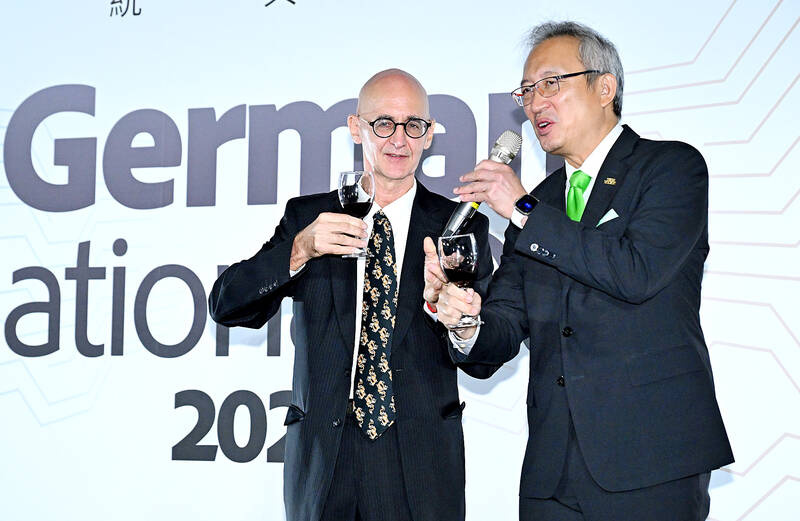Taiwan looks forward to helping Europe manufacture its own semiconductors and build secure supply chains, Deputy Minister of Foreign Affairs Francois Wu (吳志中) said on Friday at a German National Day event in Taipei.
At the event, officials from Taiwan and Germany lauded the beginning of construction of a Taiwan Semiconductor Manufacturing Co (TSMC) semiconductor fab in the German city of Dresden.
The plant broke ground at the end of August.

Photo: Liao Chen-huei, Taipei Times
“We are pleased that our countries are entering a new stage of trade and technology cooperation,” Wu said, adding that total trade between Taiwan and Germany last year exceeded US$22 billion, making Germany Taiwan’s largest EU trading partner.
Beyond trade and economics, Taiwan and Germany share the values of freedom, democracy, the rule of law and human rights, Wu said.
He also commended the passage of German warships through the Taiwan Strait on Sept. 13, the first time in 22 years, adding that such transits demonstrate Germany’s “determination to defend international law and the freedom of navigation.”
There is “comprehensive interest in Berlin” to expand exchanges between Germany and Taiwan in many different fields, German Institute Taipei Director-General Jorg Polste said.
Collaborations between Germany and Taiwan have gone beyond semiconductors. TSMC’s investment has paved the way for more joint research and academic cooperation between the two sides, he added.
The German state of Saxony inaugurated a training program this year that allows university students from Dresden University of Technology to come to Taiwan for six months to study at National Taiwan University and receive training at TSMC facilities.
More Taiwanese universities have become partners of the program and would begin receiving German students soon, including National Taiwan University of Science and Technology, National Yang Ming Chiao Tung University and National Cheng Kung University.
In a pre-recorded video, Saxony State Minister of Science Sebastian Gemkow recalled living in East Germany as a child under communist rule, and later experiencing the collapse of the Berlin Wall in 1989 and the reunification of Germany one year later.
Gemkow said he is “fortunate” to live in a free country and “the creative power” nurtured in a free society allows for the flourishing collaborations and partnerships between Taiwan and Germany today.
German National Day, also known as German Unity Day, is observed annually on Oct. 3 to mark the reunification of Germany in 1990.
The German Institute Taipei represents Berlin’s interests in Taiwan in the absence of formal diplomatic relations between the two sides.

A preclearance service to facilitate entry for people traveling to select airports in Japan would be available from Thursday next week to Feb. 25 at Taiwan Taoyuan International Airport, Taoyuan International Airport Corp (TIAC) said on Tuesday. The service was first made available to Taiwanese travelers throughout the winter vacation of 2024 and during the Lunar New Year holiday. In addition to flights to the Japanese cities of Hakodate, Asahikawa, Akita, Sendai, Niigata, Okayama, Takamatsu, Kumamoto and Kagoshima, the service would be available to travelers to Kobe and Oita. The service can be accessed by passengers of 15 flight routes operated by

Chinese spouse and influencer Guan Guan’s (關關) residency permit has been revoked for repeatedly posting pro-China videos that threaten national security, the National Immigration Agency confirmed today. Guan Guan has said many controversial statements in her videos posted to Douyin (抖音), including “the red flag will soon be painted all over Taiwan” and “Taiwan is an inseparable part of China,” and expressing hope for expedited reunification. The agency last year received multiple reports alleging that Guan Guan had advocated for armed reunification. After verifying the reports, the agency last month issued a notice requiring her to appear and explain her actions. Guan

GIVE AND TAKE: Blood demand continues to rise each year, while fewer young donors are available due to the nation’s falling birthrate, a doctor said Blood donors can redeem points earned from donations to obtain limited edition Formosan black bear travel mugs, the Kaohsiung Blood Center said yesterday, as it announced a goal of stocking 20,000 units of blood prior to the Lunar New Year. The last month of the lunar year is National Blood Donation Month, when local centers seek to stockpile blood for use during the Lunar New Year holiday. The blood demand in southern Taiwan — including Tainan and Kaohsiung, as well as Chiayi, Pingtung, Penghu and Taitung counties — is about 2,000 units per day, the center said. The donation campaign aims to boost

The Central Weather Administration (CWA) said a magnitude 4.9 earthquake that struck off the coast of eastern Taiwan yesterday was an independent event and part of a stress-adjustment process. The earthquake occurred at 4:47pm, with its epicenter at sea about 45.4km south of Yilan County Hall at a depth of 5.9km, the CWA said. The quake's intensity, which gauges the actual effects of a temblor, was highest in several townships in Yilan and neighboring Hualien County, where it measured 4 on Taiwan's seven-tier intensity scale, the CWA said. Lin Po-yu (林柏佑), a division chief at the CWA's Seismological Center, told a news conference